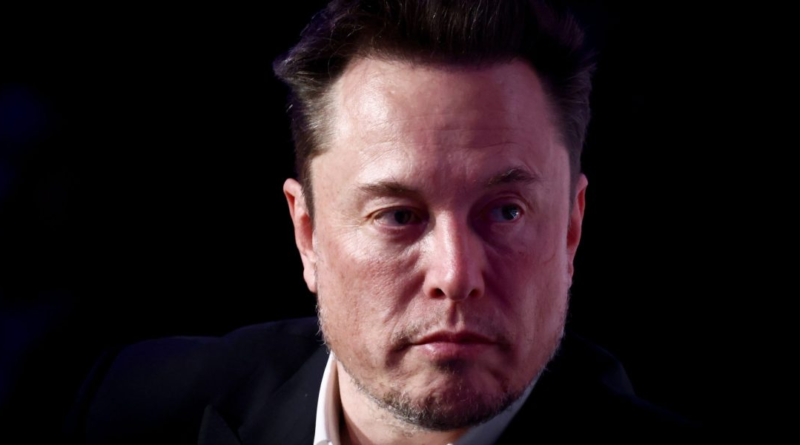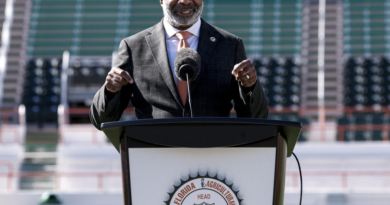Inside Elon Musk’s 23 active lawsuits
Elon Musk has shown he can dish out lawsuits as well as he fights them.
Musk and his companies have filed at least 23 lawsuits in federal courts alone since July of 2023, a Fortune analysis of federal court records shows. Combined with state suits, Musk, Tesla, X, and SpaceX have sued competitors, startups, law firms, watchdog groups, individuals, the state of California, federal agencies, and pop star Grimes, who is the mother of three of his children.
Musk has been so legally aggressive that one judge decided his litigation was more about revenge than justice: “This case is about punishing the defendants for their speech,” the judge said.
In interviews with Fortune, law professors who have studied Musk said the lawsuits display a combative, often retaliatory approach toward litigation. In cases against small nonprofits that have criticized his content moderation policies on X, as well as suits against the Department of Justice and National Labor Relations Board relating to his treatment of employees, Musk frequently goes on the offensive when his business practices are challenged by outsiders.
Angela Aneiros, a law professor at Gonzaga University, told Fortune the suits Musk has filed are fueled by the billionaire’s wealth and influence. Musk “isn’t dissuaded by losing,” she said, and he has the resources to litigate, appeal, and relitigate disputes until he wins.
“[Musk and his companies] are bringing these lawsuits to punish whoever he’s suing for criticizing him or pointing out the truth,” Aneiros said. “He’s just like, ‘I want to punish you, and I have the ability to do that.’”
X, SpaceX, and the law firms representing Musk in federal cases did not respond to multiple requests for comment.
Some of the complaints Musk has brought are centered around protecting his business interests. After California passed a law forcing social media companies to publish their policies around policing hate speech and disinformation, X sued the state on the grounds the law violated free speech protections. Tesla, which is listed as a plaintiff in more federal cases than any other Musk company (12), alleged in a suit this summer that one of its suppliers misappropriated trade secrets. The defendant, Matthews International, called the complaint meritless and “a new tactic in their ongoing efforts to bully Matthews.”
Others appear more personal. In 2023, X sued a prominent Wall Street law firm hired by Twitter’s previous management the year prior after Musk tried to back out of his agreement to purchase the company. The suit alleged Twitter’s $90 million payment to the firm was an “unjust enrichment,” and that the firm “took funds from the company cash register while the keys were being handed over.” The law firm has denied X’s claims. The case remains open and a judge has ruled the dispute should be sent to arbitration. In another filing last September, Musk sued Grimes (real name Claire Boucher) to establish a parent-child relationship with their three children. Grimes has filed her own custody suit against Musk in California, and the case was sealed in December.
X Corp. and advertising
X, Musk’s most recent business venture, has been the billionaire’s most controversial vehicle for litigation in the last year. Since July of 2023, the company has filed at least seven federal lawsuits on a range of disputes. Most have been related to X’s content moderation policies and ad revenue.
Last August, the company sued the Center for Countering Digital Hate (CCDH), a watchdog group working to stop online hate speech, after it released a report claiming that under Musk, Twitter had reinstated accounts of “neo-Nazis, white supremacists, misogynists, and spreaders of dangerous conspiracy theories.”
X responded with a complaint of its own which accused CCDH of scraping data off the site—a breach of its terms of service—and alleged that the watchdog group’s report had cost the company “tens of millions of dollars” in ad revenue.
Musk’s suit, filed in federal court in the Northern District of California, was thrown out by Judge Charles Breyer, who wrote in his decision that despite what X claimed in its complaint, the heart of the lawsuit was about “punishing the defendants for their speech.”
“Sometimes it is unclear what is driving a litigation, and only by reading between the lines of a complaint can one attempt to surmise a plaintiff’s true purpose,” Breyer wrote. “Other times, a complaint is so unabashedly and vociferously about one thing that there can be no mistaking that purpose. This case represents the latter circumstance.”
But even as the case against CCDH was dismissed unequivocally, Musk and X have continued to bring litigation against groups who have raised concerns about the company’s moderation policies and disrupted the platform’s ad revenue.
In November, X sued the liberal advocacy group Media Matters after it published a report alleging the social media site had placed ads for brands like IBM, Oracle, and Apple next to posts idealizing Hitler and the Nazis, causing some of the sponsors to pause their advertising. The nonprofit’s president has called the lawsuit “frivolous” and has stood behind its reporting.
Just this month, Musk declared “war” on an advertising group known as GARM, accusing the nonprofit in a fresh lawsuit of violating antitrust laws by colluding with a group of brands to pull ad spending from X after Musk acquired it in 2022. The court has issued summons to the defendants named in the complaint. In response to the suit, GARM’s parent organization, the World Federation of Advertisers, which is also named in the complaint, announced it was discontinuing the program due to limited resources.
“GARM is a small, not-for-profit initiative,” the group said in a statement. “Recent allegations that unfortunately misconstrue its purpose and activities have caused a distraction and significantly drained its resources and finances.” The group has not yet filed a response in court.
Musk is also personally bankrolling a suit against Disney—which paused advertising on X last year—brought by former Mandalorian actress Gina Carano over her termination. Disney has claimed First Amendment protections and the case is headed for trial in 2025.
“He wants the best of both worlds,” Aneiros told Fortune. “He wants to be able to say whatever he wants to say, and he wants some ruling to say that [other] companies can’t do anything, because it’s free speech.”
“If he can get past a motion to dismiss and extend litigation, a lot of these [groups] that he’s suing…they don’t have the power to continue to fight,” Aneiros said. “That is really, really concerning to me. Musk can bring these baseless lawsuits, he has these unlimited funds, and rather than fight it these companies will just shut down.”
GARM isn’t the only nonprofit that has been outgunned by the billionaire. Media Matters announced in May that it was forced to lay off more than a dozen staff members, in part due to the cost of the legal battle with Musk. CCDH’s current website includes a link to donate along with a note that claims “fighting against Elon Musk’s lawsuit has cost us thousands of dollars and delayed our work to hold social media giants accountable.”
Forum shopping
Part of the reason Musk appears unaffected by prior legal defeats may be because his tactics have changed.
Recently, some legal experts have accused the billionaire of “forum shopping”—the practice by which litigants choose courts or jurisdictions that are most likely to give them favorable ruling—and one judge in Texas seems to have become a particular favorite.
Whereas the CCDH suit was filed in California, X brought the Media Matters case before U.S. judge Reed O’Connor in Fort Worth, even though neither party is based in Texas. O’Connor, a George W. Bush appointee, is a contributor to the Federalist Society who has handed down favorable rulings for conservatives in the past. His most recent financial disclosures show he’s invested between $15,001 and $50,000 in Tesla stock.
As with CCDH, Media Matters filed a motion to dismiss X’s case against it, but O’Connor has allowed the discovery process to begin.
Aneiros told Fortune the Media Matters case was one of the lawsuits Musk is involved in that she is watching most closely.
“It has the potential to force companies not to say things because they don’t want to get sued if they criticize X or Musk,” she said. “I don’t know what’s going to happen in that case. I don’t think it should be any different than the CCDH case, but because it’s in front of that other judge, we’ll see what happens with that one.”
Until recently, O’Connor was presiding over the case against advertisers as well, but recused himself on Aug. 13. Although the judge gave no reason for his recusal, the announcement came shortly after NPR published a report highlighting his Tesla investments.
O’Connor’s office did not respond to Fortune’s requests for comment.
SpaceX and employment disputes
Fort Worth isn’t the only favorable jurisdiction Musk has found in Texas.
In August 2023, the DOJ filed a complaint against SpaceX alleging that the company routinely discriminated against refugees and asylum seekers in its hiring process. In response to the suit Musk called the complaint “a weaponization of the DOJ for political purposes,” and in September the rocket and satellite maker hit back with a lawsuit of its own in Brownsville, Texas.
In the suit, SpaceX complained that the process for appointing administrative judges who hear cases involving employment bias against immigrants was unconstitutional. U.S. district judge Rolando Olvera, a Trump appointee, backed the company’s claim, suspending the DOJ case against SpaceX.
Joan MacLeod Heminway, a law professor at the University of Tennessee, told Fortune that Musk has taken a conservative view on the power of federal agencies and their ability to regulate businesses.
“I think the advice of counsel that he’s getting is that there are some openings for those kinds of lawsuits now,” Heminway said. “We’re in a very dynamic stage—especially when it comes to government lawsuits—with respect to federal agencies and how much power they should have.”
It’s a strategy SpaceX has employed more than once, and the company has fought tooth and nail to keep other cases in Texas. After the U.S. Labor Relations Board accused the rocket maker of illegally firing employees, SpaceX filed a suit against the NLRB a day later, again calling into question the constitutionality of the government agency’s structure. Like the DOJ suit, the complaint was filed in Brownsville.
This time, though, Judge Olvera ruled the case had to be transferred to California, where the events that triggered the suit occurred.
In a complex string of legal motions, SpaceX then appealed to a U.S. circuit court twice to have the transfer reconsidered. The appeals court finally granted the company a temporary block on the NLRB case in May. The case is still in Brownsville, though the NLRB has been given approval to move to transfer it to California.
In fact, the company filed a second suit against the NLRB in the spring on the same issue, this time in Waco, Texas, under another Trump appointee, Judge Alan Albright. Under a standing order, all non-patent civil cases in Waco are assigned to Albright (Olvera, in Brownsville, gets 50% of civil cases). Albright granted SpaceX a temporary block on the NLRB case in July.
“He doesn’t like losing, and if he loses based on a current rule, he’s going to challenge the rule,” Heminway told Fortune. “Or he’s going to challenge the ruling if it’s not made by the highest authority in the land.”
Elon Musk’s personal legal battles
In personal legal battles, Musk has shown an equal determination to see things through. Earlier this year, the billionaire filed a suit against OpenAI and its CEO Sam Altman. Musk, who cofounded the startup, and has since launched his own AI venture, accused OpenAI of abandoning its mission to develop artificial intelligence for the benefit of humanity rather than for profit.
This summer, Musk withdrew the suit, filed in San Francisco’s Superior Court, one day before a judge was prepared to hear OpenAI’s motion to dismiss the case. But on Aug. 5 Musk doubled down with a new complaint.
Unlike the previous complaint, the new case has been filed in federal court. The federal case allowed Musk’s lawyer Marc Toberoff to include allegations of civil racketeering, whose suit argues that OpenAI and Altman conspired to defraud the billionaire, who made investments in the startup on the assumption the product would be open-source.
“OpenAI was Sam Altman’s Trojan horse,” Toberoff told Fortune in a statement. “This lawsuit at its core holds defendants accountable for their intentional misrepresentations to Elon Musk and to the public.”
In response to the initial suit, OpenAI published emails it said were sent by Musk in 2018 suggesting the startup should become part of Tesla, and said Musk understood early on that OpenAI’s mission did not imply open-sourcing.
“As we said about Elon’s initial legal filing, which was subsequently withdrawn, Elon’s prior emails continue to speak for themselves,” a spokesperson for OpenAI, told the Washington Post after the second suit was filed.
“He basically is just not afraid of suing on any grounds,” Heminway said. “I’m not saying he disregards the law, but he really does like to push the envelope on the law. He’ll listen to legal advice, and then he does what he wants, and then somebody has to clean up the mess, from a lawyering perspective, afterward. And even if he loses the case, he doesn’t seem to care.”




